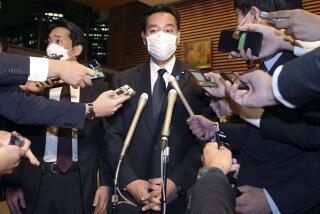DISABILITY : Key Official’s Illness Keeps Japan Edgy : Tokyo leaders’ medical problems are often concealed. So when a powerful figure has surgery. . . .
- Share via
TOKYO — Political rumor mills already have started whirling over the health of Foreign Minister Michio Watanabe, 68, and the effect it may have on the future of Prime Minister Kiichi Miyazawa.
Widely regarded as the most likely successor to Miyazawa, Watanabe underwent a 2 1/2-hour gallstone operation Tuesday during which his gallbladder was removed. Doctors said he was “in highly satisfactory condition.”
No evidence emerged to contradict that report.
But the long practice here of concealing politicians’ ailments contributed to rumors that the illness might sidetrack Watanabe, who also serves as deputy prime minister, from achieving his ambition to succeed Miyazawa.
In recent years, doctors, in initial announcements, have concealed:
* A heart attack that eventually claimed the life of the late Prime Minister Masayoshi Ohira.
* A stroke that crippled former Prime Minister Kakuei Tanaka, ultimately ending his political career.
* And the stomach cancer that ultimately killed the late Foreign Minister Shintaro Abe.
Like Watanabe, Abe was regarded as the “crown prince” when his illness initially was described as gallstones.
Twice already, Watanabe’s aides have gone out of their way to declare that the leader of the fourth-largest ruling Liberal Democratic Party faction--67 members of Parliament--faces no crisis.
A day before the operation, Ihei Ochi and Takashi Fukaya, executives of the faction, told reporters that recuperation could prevent Watanabe from attending the economic summit that will bring together leaders of the United States, Japan, Canada, Germany, France, Britain and Italy in Munich July 6-8. But they emphasized that “it is clear he is not suffering from any life-threatening condition.”
Medically speaking, neither a gallstone operation nor removal of a gallbladder is cause for alarm. Experts said Watanabe’s long recovery may be attributed, in part, to part of the procedure he underwent, in which physicians inserted a drainage tube into his bile duct.
But doctors not connected with the case noted that the nine-day diagnosis period that preceded his operation was unusually exhaustive. Cancer of the pancreas, they added, would not be detected in routine, periodic medical checkups.
Miyazawa, who took over the foreign minister’s portfolio after Watanabe was hospitalized May 31, visited Watanabe before his operation to assure him that his dual jobs as the nation’s chief diplomat and deputy prime minister would be waiting for him whenever he recovered.
Dressed in a dark kimono, Watanabe spent 10 minutes Monday with Japanese reporters at the hospital. He said he had told both Miyazawa and ruling party officials to decide on their own whether to replace him.
Although Miyazawa rode into office last November on a crest of high expectations of more positive leadership for Japan, it was Watanabe who emerged as the workhorse of Japanese diplomacy.
Overseas, he represented Japan at international conferences on peace in the Middle East and economic assistance to Russia and the Commonwealth of Independent States. At home, he took the lead in working out a compromise with two opposition parties to win support for legislation to permit Japan to dispatch troops overseas to participate in disaster relief and U.N.-sponsored peacekeeping activities for the first time since World War II.
Pundits agreed that the loss of Watanabe would weaken Miyazawa’s Cabinet in the short run but could ultimately prolong his grasp on the prime minister’s post.
Although his popularity ratings in opinion polls have recovered in the last month to as high as 35% from 20% earlier this year, Miyazawa, 72, had widely been expected to serve only one two-year term, ending in November, 1993.
No other potential successor within the ruling party rivals Watanabe’s stature. Last October, Watanabe, who will be 69 on July 28, finished second to Miyazawa in a three-way race for the party presidency, a post that carries with it the premiership.
More to Read
Sign up for Essential California
The most important California stories and recommendations in your inbox every morning.
You may occasionally receive promotional content from the Los Angeles Times.













